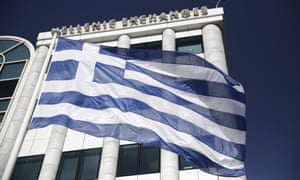Dimitris Costopoulos stood, worry beads in hand, under brilliant blue skies in front of the Greek parliament. Wearing freshly pressed trousers, polished shoes and a smart winter jacket – “my Sunday best” – he had risen at 5am to get on the bus that would take him to Athens 200 miles away and to the great sandstone edifice on Syntagma Square. By his own admission, protests were not his thing.
At 71, the farmer rarely ventures from Proastio, his village on the fertile plains of Thessaly. “But everything is going wrong,” he lamented on Tuesday, his voice hoarse after hours of chanting anti-government slogans.
---For Background Knowledge read:
Yanis Varoufakis and the Greek Tragedy
----
“Before there was an order to things, you could build a house, educate your children, spoil your grandchildren. Now the cost of everything has gone up and with taxes you can barely afford to survive. Once I’ve paid for fuel, fertilisers and grains, there is really nothing left.”
Costopoulos is Greece’s Everyman; the human voice in a debt crisis that refuses to go away. Eight years after it first erupted, the drama shows every sign of reigniting, only this time in a new dark age of Trumpian politics, post-Brexit Europe, terror attacks and rise of the populist far right.
“I grow wheat,” said Costopoulos, holding out his wizened hands. “I am not in the building behind me. I don’t make decisions. Honestly, I can’t understand why things are going from bad to worse, why this just can’t be solved.”
As Greece hurtles towards another full-blown confrontation with the creditors keeping it afloat, and as tensions over stalled bailout negotiations mount, it is a question many are asking.
The country’s epic struggle to avert bankruptcy should have been settled when Athens received €110bn in aid – the biggest financial rescue programme in global history – from the EU and International Monetary Fund in May 2010. Instead, three bailouts later, it is still wrangling over the terms of the latest €86bn emergency loan package, with lenders also at loggerheads and diplomats no longer talking of a can, but rather a bomb, being kicked down the road. Default looms if a €7.4bn debt repayment – money owed mostly to the European Central Bank – is not honoured in July.

Farmer Dimitris Costopoulos in front of the Greek parliament in Athens. Photograph: Helena Smith for the Observer
Amid the uncertainty, volatility has returned to the markets. So, too, has fear, with an estimated €2.2bn being withdrawn from banks by panic-stricken depositors since the beginning of the year. With talk of Greece’s exit from the euro being heard again, farmers, trade unions and other sectors enraged by the eviscerating effects of austerity have once more come out in protest.
From his seventh-floor office on Mitropoleos, Makis Balaouras, an MP with the governing Syriza party, has a good view of the goings-on in Syntagma. Demonstrations – what the former trade unionist calls “the movement” – are a fine thing. “I wish people were out there mobilising more,” he sighed. “Protests are in our ideological and political DNA. They are important, they send a message.”
This is the irony of Syriza, the leftwing party catapulted to power on a ticket to “tear up” the hated bailout accords widely blamed for extraordinary levels of Greek unemployment, poverty and emigration. Two years into office it has instead overseen the most punishing austerity measures to date, slashing public-sector salaries and pensions, cutting services, agreeing to the biggest privatisation programme in European history and raising taxes on everything from cars to beer – all of which has been the price of the loans that have kept default at bay and Greece in the euro.
In the maelstrom the economy has improved, with Athens achieving a noticeable primary surplus last year, but the social crisis has intensified.
For men like Balaouras, who suffered appalling torture for his leftwing beliefs at the hands of the 1967-74 colonels’ regime, the policies have been galling. With the IMF and EU arguing over the country’s ability to reach tough fiscal targets when the current bailout expires in August next year, the demand for €3.6bn of more measures has left many in Syriza reeling. Without upfront legislation on the reforms, creditors say, they cannot conclude a compliance review on which the next tranche of bailout aid hangs.
“We had an agreement,” insisted Balaouras, looking despondently down at his desert boots. “We kept to our side of the deal, but the lenders haven’t kept to their side because now they are asking for more. We want the review to end. We want to go forward. This situation is in the interests of no one. But to get there we have to have an honourable compromise. Without that there will be a clash.”
It had been hoped that an agreement would be struck on Monday at what had been billed as a high-stakes meeting of euro area finance ministers. On Friday, EU officials announced that the deadline had been all but missed because there had been little convergence between the two sides.
With the Netherlands holding general elections next month, and France and Germany also heading to the polls in May and September, fears of the dispute becoming increasingly politicised have added to its complexity. Highlighting those concerns, the German chancellor, Angela Merkel, attempted to end the rift that has emerged between eurozone lenders and the IMF over the fund’s insistence that Greece can only begin to recover if its €320bn debt pile is reduced substantially.
In talks with Christine Lagarde, the Washington-based IMF’s managing director, Merkel agreed to discuss the issue during a further meeting between the two women to be held on Wednesday. The IMF has steadfastly refused to sign up to the latest bailout, arguing that Greek debt is not only unmanageable but on a trajectory to become explosive by 2030. Berlin, the biggest contributor of the €250bn Greece has so far received, says it will be unable to disburse further funds without the IMF on board.
The assumption is that the prime minister, Alexis Tsipras, will cave in, just as he did when the country came closest yet to leaving the euro at the height of the crisis in the summer of 2015. But the 41-year-old leader, like Syriza, has been pummelled in the polls. Persuading disaffected backbenchers to support more measures, and then selling them to a populace exhausted by repeated rounds of austerity, will be extremely difficult. Disappointment has increasingly given way to the death of hope – a sentiment reinforced by the realisation that Cyprus and other bailed-out countries, by contrast, are no longer under international supervision.
In his city centre office, the former finance minister Evangelos Venizelos pondered where Greece’s predicament was now. “[We are] at the same point we were several years ago,” he joked. “The only difference is that anti-European sentiment is growing. What was once a very friendly country towards Europe is becoming increasingly less so, and with that comes a lot of danger, a lot of risk.”
When historians look back they, too, may conclude that Greece has expended a great deal of energy not moving forward at all.
The arc of crisis that has swept the country – coursing like a cancer through its body politic, devastating its public health system, shattering lives – has been an exercise in the absurd. The feat of pulling off the greatest fiscal adjustment in modern times has spawned a slump longer and deeper than the Great Depression, with the Greek economy shrinking more than 25% since the crisis began.
Even if the latest impasse is broken and a deal is reached with creditors soon, few believe that in a country of weak governance and institutions it will be easy to enforce. Political turbulence will almost certainly beckon; the prospect of “Grexit” will grow.
“Grexit is the last thing we want, but we may arrive at a point of serious dilemmas,” said Venizelos. “Whatever deal is reached will be very difficult to implement, but that notwithstanding, it is not the memoranda [the bailout accords] that caused the crisis. The crisis was born in Greece long before.”
Like every crisis government before it, Tsipras’s administration is acutely aware that salvation will come only when Greece can return to the markets and raise funds. What happens in the weeks ahead could determine if that is likely to happen at all.
Back in Syntagma, Costopoulos the good-natured farmer ponders what lies ahead. Like every Greek, he stands to be deeply affected. “All I know is that we are all being pushed,” he said, searching for the right words. “Pushed in the direction of somewhere very explosive, somewhere we do not want to be.”






